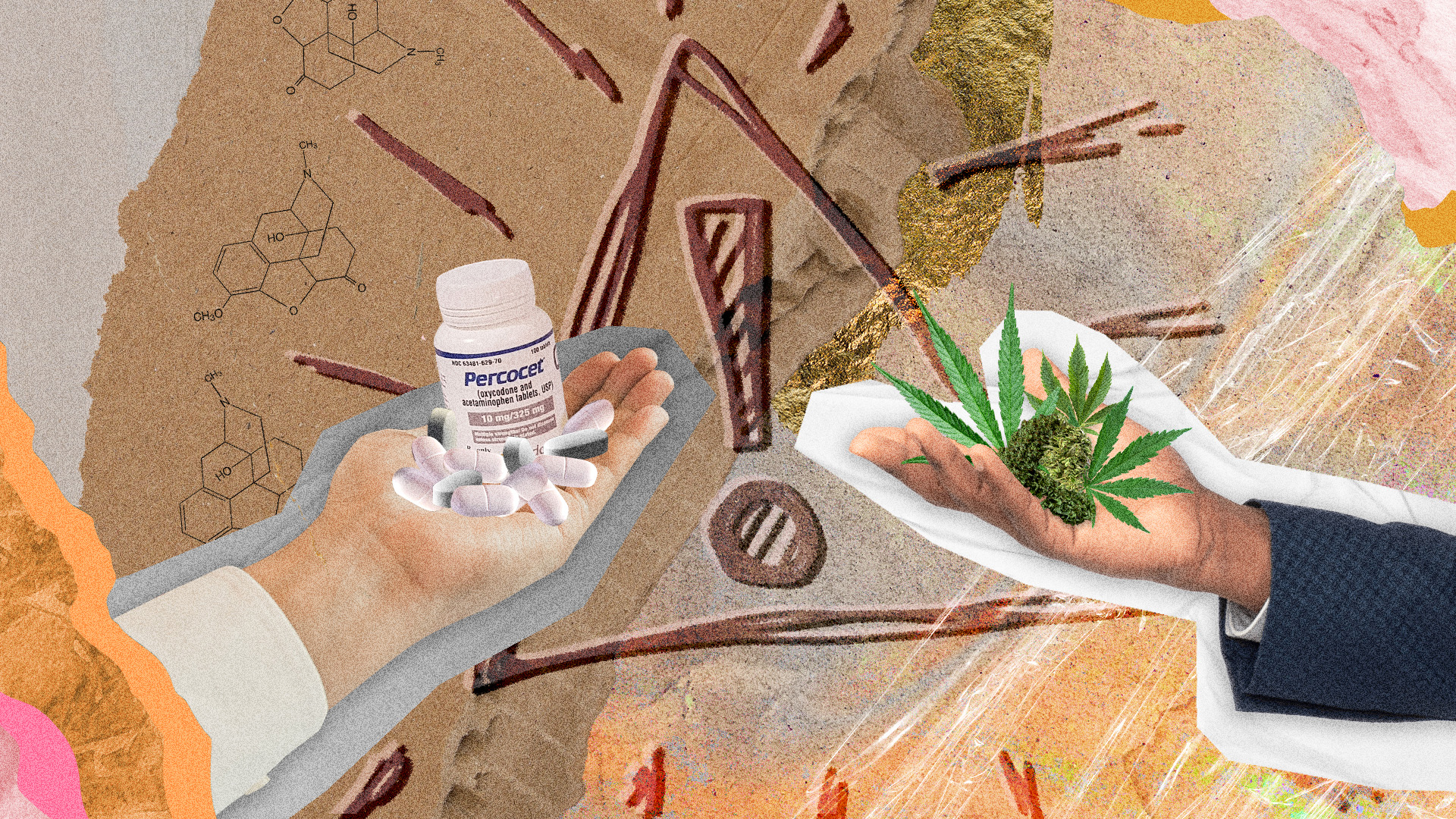Are you wondering about the safety of combining Percocet, a popular opioid prescription medication, with cannabis? While research on mixing cannabis with powerful opiates like Percocet is limited, we can still explore their potential interactions through existing studies, several meta-analyses, and anecdotal reports from folks in the know.
In this blog post, we’ll delve into the subject, providing you with comprehensive information on the safety and potential adverse effects of combining Percocet and cannabis.
What is Percocet?
Percocet is a potent medication prescribed for moderate to severe pain relief. It combines oxycodone, which alters pain perception by binding to opioid receptors in the brain and spinal cord, with acetaminophen, a common OTC pain reliever and fever reducer that enhances its analgesic effects.
What Are Some Possible Side Effects of Combining Weed and Percocet?
When Percocet is mixed with cannabis, several potential adverse reactions can occur. This is because they are metabolized by the same enzyme families, meaning that taking both will increase the levels of each other and, therefore, the chances of side effects.
However, a key advantage of this drug interaction is that less opioid dosing is needed when they are combined. This is one way that cannabis can be a potential harm-reduction tool, but side effects are still possible. Some possible side effects that may happen include:
- Enhanced Sedation: Both Percocet and cannabis can cause sedation. This effect may be amplified when taken together, leading to increased drowsiness and lethargy.
- Increased Risk of Respiratory Depression: Opioids like Percocet can depress the respiratory system, while cannabis alone does not. However, combining them can increase opioid levels and may increase the risk of respiratory depression. This is particularly concerning as it can lead to life-threatening situations.
- Cognitive Impairment: The combination can impair cognitive functions more than either substance alone, leading to issues with concentration, memory, and decision-making.
- Dizziness and Coordination Problems: Both substances can cause dizziness and affect coordination, increasing the risk of accidents and injuries. Older or frail individuals must exercise more caution.
- Increased Heart Rate: Cannabis can cause an increase in heart rate, which might be problematic when combined with opioids, especially for individuals with heart conditions.
- Nausea and Vomiting: While cannabis is sometimes used to ease nausea, in some cases, especially when mixed with opioids, it might contribute to gastrointestinal distress, including nausea and vomiting.
- Increased Anxiety or Paranoia: In some individuals, high THC amounts or concentrates of cannabis can induce anxiety or paranoia, and mixing it with Percocet might exacerbate these psychological effects.
Please keep in mind that the response to combining these substances can differ substantially among people based on factors such as personal health, dosage, and tolerance levels. Therefore, consulting a healthcare professional before combining medications or substances is always advisable.
What Are Some Alternatives and Safer Practices For Combining Percocet and Weed?
When it comes to pain relief and enhancing cannabis experiences, it’s important to explore alternatives and safer practices instead of combining Percocet and cannabis.
For managing pain, healthcare professionals often recommend non-opioid pain relievers, physical therapy, and non-pharmacological approaches such as acupuncture or cognitive behavioral therapy.
Why You Should Get Your Medical Marijuana Card
Veriheal has satisfied millions of patients nationwide by giving them access to these benefits
- Larger purchase limits
- Peace of mind
- Enhanced legal protection
- Access to higher potency strains
- Save up to 25% on cannabis purchases
- Skip the line at the dispensary
However, if Percocet and cannabis are still on the table, it’s crucial to consult with a healthcare provider or pharmacist. They can provide personalized guidance and suggest dosage adjustments or monitoring strategies to mitigate risks.
A knowledgeable provider may recommend a lower dose of opioids when cannabis is added to the therapeutic plan. This interaction can be helpful for transitioning off opioids as well.
Additionally, educating oneself about potential side effects, understanding personal health conditions, and following prescribed dosages are important steps to ensure safer usage. Ultimately, putting health and safety first while addressing pain or seeking recreational experiences should be the goal.
In A Nutshell
The combination of Percocet and cannabis is not always safe, as there are interactions and side effects that negatively affect your health. However, this largely depends on the dose, and so lower doses may still be used safely with your provider’s guidance. It’s essential to be mindful of drug interactions with any medication or medical condition you may have.
The best advice is to get a second opinion from your physician or pharmacist before making any decisions. If you’re considering taking cannabis as an alternative treatment for pain after being prescribed Percocet, make sure you take into account the dosage of both substances.
This is one time that microdosing cannabis will be the key to your outcome, where ‘greening out’ is a serious possibility if you’re not paying attention to how much cannabis you’re ingesting and the potency of that particular strain.
Lastly, also try to consider non-intoxicating methods of cannabis such as topical products or CBD or CBG oil to reduce pain and other symptoms while avoiding potentially dangerous side effects caused by combining multiple medications together.
Veriheal allows you to stay informed and make informed decisions that will benefit you today and in the future!
Note: The content on this page is for informational purposes only and is not intended to be professional medical advice. Do not attempt to self-diagnose or prescribe treatment based on the information provided. Always consult a physician before making any decision on the treatment of a medical condition.
Author, Share & Comments
















